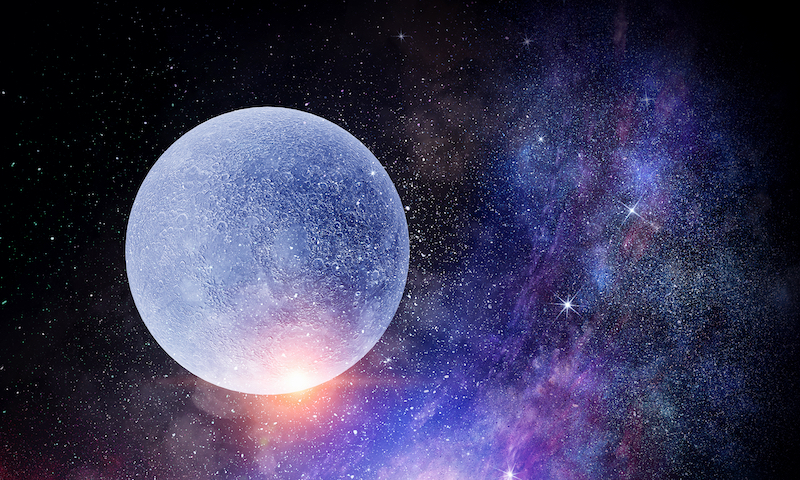
by Somya Devi | Jun 13, 2022 | Astrology, Conjunctions, Planets Changing Signs, Retrograde
Full Moon in Scorpio, June 2022
Tonight the Moon waxes into fullness into sidereal Scorpio, coming fully opposite the Taurus Sun, both at 29 degrees 16 minutes, one of the three gandanta points in the zodiac. The Moon receives an aspect from both Jupiter and Saturn, while Sun joins Mercury. Saturn is currently in retrograde motion and will soon head back into Capricorn for several more months before finishing its final transit there. We also approach the solstice on June 21st, the brightest day of the year.
Full Moon in Scorpio
Scorpio is the sign where the Moon is considered debilitated, because the fickle and sensitive mind feels a lot of intensity in the watery sign ruled by warrior Mars. At the same time, a full Moon is always a strong Moon, so this is an opportunity to raise our courage when confronting that difficulty. Scorpio is a sign of change, being the natural eighth sign, and under this full Moon we can strive to embrace change and find some freedom amidst the Sun’s cycle of Taurus, which compels us towards a more grounded, fixed and secure existence.
Gandanta Point
Being in this particular last degree of Scorpio, however, the Moon finds itself in the gandanta degree which is somewhat of a cosmic and karmic “knot.” We pay feel particularly locked into something that is challenging us, even though we know that we must push through to allow the change. Under this full Moon, search for your inner warrior, strength, and courage, and call upon your guides to help you in evolving into the next phase of your life.
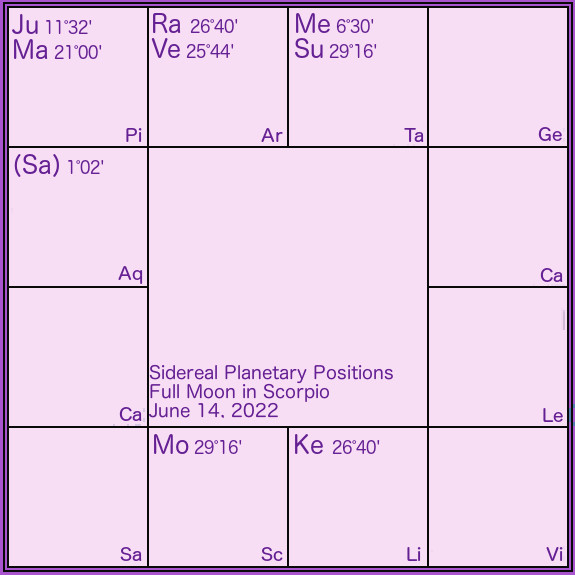
Jyestha Nakshatra
The full Moon lies in Jyestha nakshatra, the Vedic sign known as the “eldest.” This star asks us to be responsible, like its deity Indra who is the chief of the gods. Where in your life are you responsible for others, perhaps those with lesser abilities or privilege? Generosity and charity are encouraged by this star at the end of Scorpio who is the last before we enter the charitable and righteous sign of Sagittarius.
Aspects of Jupiter and Saturn
Both Jupiter and Saturn aspect this Moon. Jupiter is sva in his own sign of Pisces at the moment, and his aspect of the Moon brightens our optimism and idealism, bringing our principles and beliefs into the fold as we strive to allow some inner transformation. Saturn, in turn, adds more energy of responsibility, and gives us an awareness of the future consequences of our action. Together the two can add a discerning influence on the decisions that we make at this time.
Retrograde Saturn
Saturn has been in retrograde motion since June 4th, and now appears to be making his way backwards through Aquarius before he heads back into Capricorn again on July 12th. He rules both Aquarius and Capricorn, so he maintains strength through this time, and will be getting brighter and brighter each night over the next month. The powerful Saturn of this time continues to put pressure on society at large, adding a crushing weight of the awareness of consequences, as we consider what type of structures need to be in place for us to advance into the next era.
Solstice
The summer solstice is the peak of what we might call the Sun’s waxing cycle, as it is the day with the most daylight and the fewest dark hours, in the northern hemisphere. This is the most outward time of year for most people, when we are literally outside, and filling our schedules with social interactions, barbecues, and activity. It is a time to celebrate life! If you’re more of a natural introvert, this time of year can become exhausting, so be sure to pace yourself. It is a beautiful time to commune with nature and experience the fullness of what the light and life cycle has to offer.
Sadhana suggestions for tuning in with the Scorpio full Moon:
- Fast or meditate this Tuesday (the actual day of the full Moon, and the day ruled by Mars, Scorpio’s ruler)
- Make an altar that includes water and fire elements, connecting with your emotions and warrior
- Spend some time outside checking out ground insects, watching how they move and work
- Utilize red crystals on your altar or for japa (mantra chanting)
- Chant a Moon or Mars mantra, or both
Personal readings available here

by Somya Devi | Apr 29, 2022 | Astrology, Conjunctions, Eclipses, Events, Holy Days, Planets Changing Signs
Eclipse Season, Venus-Jupiter Conjunction, and Akshaya Tritiya
There is so much going on in the sky right now, this is an exciting time for astronomers and astrologers alike. Tonight brings a Dark Moon as Sun and Moon approach each other for an exact New Moon conjunction on April 30th at 4:28 pm ET. They join in sidereal Aries, where Sun is exalted and Rahu is currently transiting as well. This meeting of Sun, Moon and Rahu stimulates a solar eclipse around the time of the New Moon, the first eclipse of this spring’s eclipse season, with the lunar eclipse following on the Full Moon of May 15th-16th. Additionally, Venus and Jupiter are having their closest conjunction of the year on April 30th as well!
Aries Moon Cycle
The Aries Moon cycle begins when Sun and Moon join in sidereal Aries. If you’ve forgotten the difference between sidereal and tropical systems, here it is! I just re-read this article and definitely recommend checking it out if this is a concept you strive to understand. The Sun is exalted as it travels through Aries, bringing forth a strong sense of vitality and energy as we emerge into the growing season in the northern hemisphere. The Aries cycle is a time for beginning and giving birth to things, just as we see reflected in nature.
Bharani Nakshatra
This Moon cycle begins literally with Sun and Moon in the Vedic nakshatra Bharani, “the bearer,” the star of birth and death. It is represented by a womb, associated with fertile Venus, ruled by death deity Yama, and opens a portal between the worlds of living and dying. This moon cycle is an opportune time to plant the seeds you are wishing to cultivate, both literally and figuratively.
Akshaya Tritiya
Three days after the New Moon in Aries, on Tuesday, May 3rd, the Moon travels through its sign of exaltation as well— Taurus. A sign of exaltation is the place where a planet is considered extremely well-placed, supported by the ruler of that sign, and in good relationship with its home sign. It’s where the planet is most likely to be able to express itself positively through us. With the Sun exalted in Aries, it is supported by its ruler Mars, a planet that adds courage and strength to Sun who seeks to express power and vitality. With the Moon exalted in Venus-ruled, earth-sign Taurus, it gets to rest on fertile and stable ground, an excellent place for our watery, emotional and often changeable mind to reside in the feminine.
With both Sun AND Moon exalted at the same time, this signals that our minds, bodies, and spirit are extremely well-supported. For this reason, this “tritiya” (third waxing Moon) day is thought to be a day that offers only auspicious, prosperous, everlasting results. Hence it is deemed Akshaya Tritiya, “akshaya” being that which is without loss, that which never diminishes. In India this is a major moment for investments, new beginnings, and large purchases, especially of gold and silver. It is thought that your returns will be “never diminishing.”
Although usually I like to offer specific Muhurta selections based on one’s individual natal chart, this day is generally considered auspicious in general for new endeavors, purchases, and investments.
Solar Eclipse
April 30th, the New Moon, itself brings with it a solar eclipse that will be visible from parts of South America and Antarctica. Its effects, however, can be felt across the globe. You may have already noticed tensions rising in your life this week, especially around certain areas where you have felt stuck. Eclipses are when the shadow energy becomes visible (we literally see a shadow when the grahas Rahu and Ketu align with Sun, Moon and Earth). They tend to bring to light areas that require our attention and change, whether it be by eliminating limiting beliefs or patterns, or by stepping into something we have resisted.
This is the first eclipse of a 1.5-year cycle that began when Rahu and Ketu transited into the Aries-Libra axis on April 12th, after their year-and-half transit of Taurus and Scorpio before that. This longer cycle and the biannual eclipse seasons within it are likely to “bring stuff up” for you in whatever areas of life are indicated by Aries and Libra in your Vedic natal chart, and may stimulate other karma depending upon what other planets are there in your chart.
As in many traditional cultures, in Vedic thought eclipses are considered inauspicious times, because the natural order of the universe is turned on its head. It is best not to plan any important activities or new beginnings during the hours of the eclipse itself (2:25 PM – 6:38 PM ET, with maximum eclipse at 4:42). Instead, spiritual practice such as prayer or meditation is advised, as these are the best remedies for dealing with the disruptive, confusing and often virulent energy of the nodes, Rahu and Ketu. Hindu culture advises against eating, drinking or being outside during the eclipse hours as well, especially if you live in its visible path.
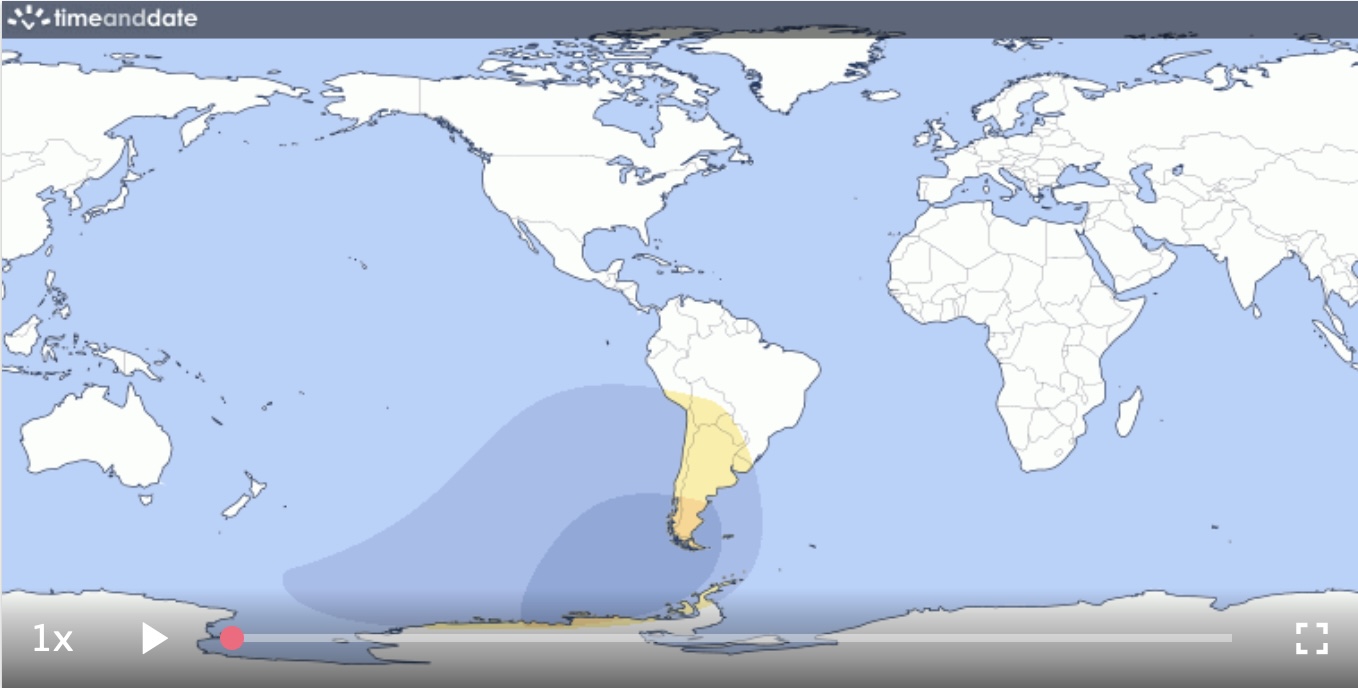
This is the first eclipse of two that are coming this eclipse season, the second being a lunar eclipse on the Full Moon of May 15th-16th, which will be visible from most of the Americas, Europe, Africa and the Middle East. After that the eclipse season ends until the next set which will come in October-November of this year.
Some astrologers advise people to do things around an eclipse as these can be transformative times. They can definitely be transformative, but I always caution clients that if you are to make a major decision during an eclipse season, be sure that it comes from a place of clarity, after much reflection and introspection, and that it is not based out of stress, fear, or overwhelm with your current situation.
Jupiter-Venus Conjunction/War
In addition to the New Moon and Solar Eclipse, Saturday also brings the exact conjunction of Jupiter and Venus, at 5:14 pm ET in sidereal Pisces. The two will be traveling together in this sign from April 27th through May 23rd, when Venus moves into Aries. Jupiter is the ruler of Pisces, while Venus is exalted there, giving the two brightest planets a lot of power right now. It will be a beautiful sight to behold on the early mornings of April 30th and May 1st, while they can be seen extremely close together rising a little while before the Sun. (EarthSky has some great visuals on what to look for in the early morning eastern sky.)
The intense proximity of the two, however, creates what is known as a graha yuddha or planetary war in Vedic astrology. This happens whenever two planets come within one degree of each other, as these two do from April 29th through May 1st. When this happens, both planets are considered to be weakened because they must vie with each other for power and our attention. Thus the areas ruled by Jupiter (inspiration, hope, beliefs) and Venus (happiness, romance, art, beauty, nature) in general and in our personal charts, may suffer during this time.
The war between Jupiter and Venus can be particularly difficult as these two are quite inimical to each other, Jupiter being the guru of the Gods and Venus that of the Asuras (demons). Jupiter or Guru guides us to acquire our higher belief systems, knowledge, and wisdom, while Venus or Shukra motivates us mainly towards pleasure. It is for this reason that Venus becomes exalted in Pisces, because when under Jupiter’s influence, in this other-worldly water sign, we are often able to align our desires with a higher power or purpose.
So enjoy the spectacle of the two brightest planets this weekend, but consider the highest potential of the two as you feel the waves of emotion that may come as they battle it out, with the Moon and eclipsed Sun joining Rahu in fiery Aries. Overall I do believe this whole setup offers a lot of potential for inner growth, if we take the time to go inward and seek insight around our highest purpose, desires, and intentions for this season’s new beginnings.

by Somya Devi | Nov 3, 2021 | Astrology, Conjunctions, Eclipses, Holy Days
Diwali New Moon 2021
Thursday, November 4th brings a New moon at 5:15 pm ET and marks the celebration of Diwali, the Hindu festival of lights. As the world outside darkens, we clean our houses and light candles and lamps to celebrate the light, calling in the auspicious blessings of goddess Lakshmi and Lord Rama, gathering with family and friends to share warmth as the season becomes cold.
New Moon in Libra and Swati
This Diwali is marked by the New Moon in sidereal Libra, as Sun and Moon join with both Mars and Mercury there. Libra is a sign about balance, where we seek to bring balance and harmony into our relationships and the outer world. The sky is very imbalanced at this time, however, with eight out of nine grahas clustered on one side of the sky, towards the galactic center.
The four planets join in the Vedic nakshatra of Swati, symbolized by a young sprout blowing in the wind. With Sun debilitated here, it can be easy to lose our center and fall out of balance, especially as the cold vata winds are increasing in the outer atmosphere. This time of year self-care is of utmost importance!
Saturn and Jupiter
Saturn and Jupiter are together again in sidereal Capricorn, with Saturn aspecting the New Moon and putting on the pressure to constrict pleasures and focus on responsibilities. The two together can bring power to some situations, but despite the neecha bhangha yoga being created, Jupiter will be much more comfortable and able to offer more expansive blessings when he transits once again into Aquarius on November 20th.
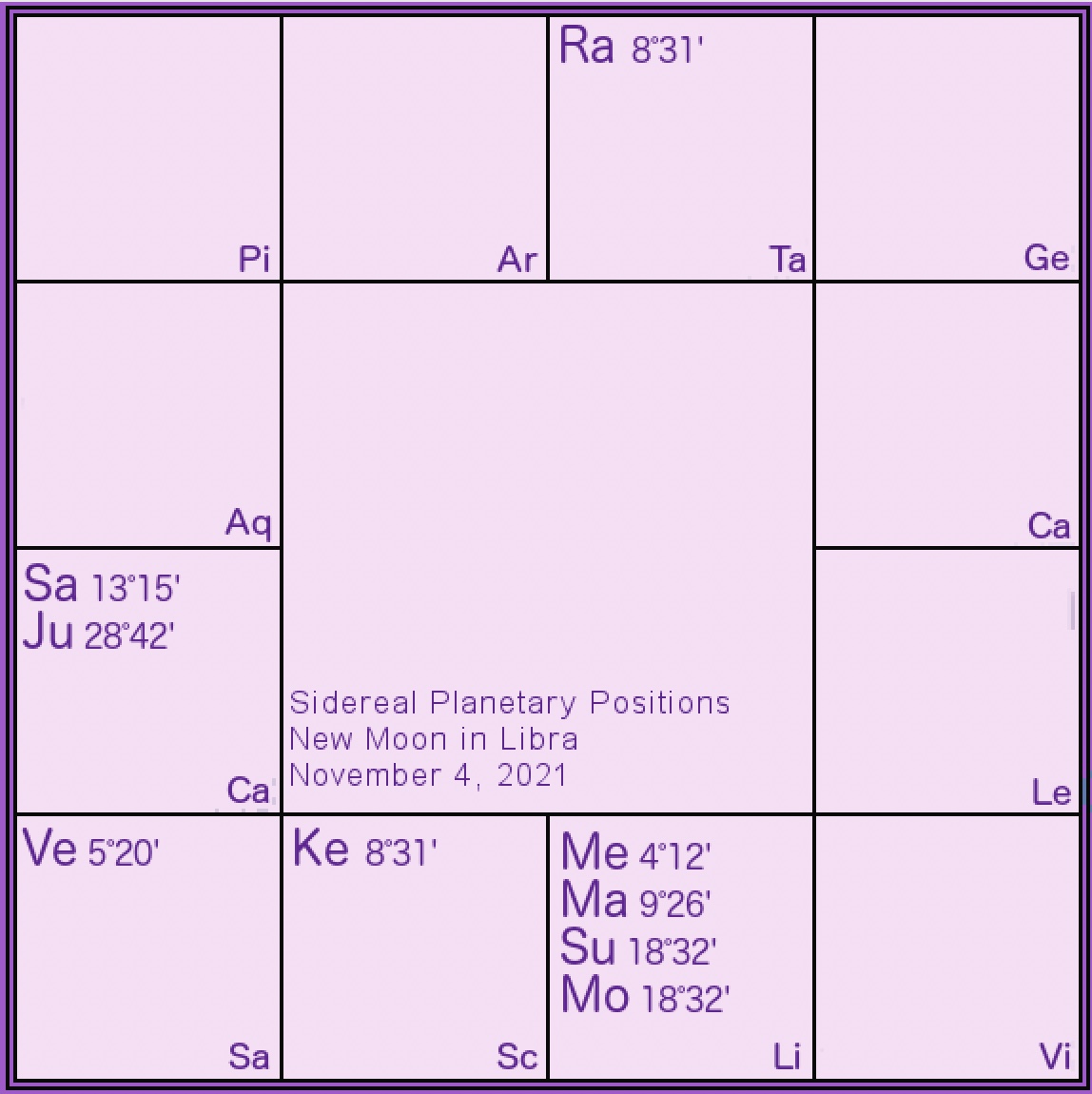
Eclipses
This New Moon actually brings us straight into an eclipse period, with a lunar eclipse occurring on the coming full Moon of November 18th-19th, and a total solar eclipse on the next New Moon of December 4th. Eclipse periods stir up energy from the shadows, making red flags wave bright and bringing the opportunity to navigate discomfort with grace or clumsiness. Depending on your natal chart this could be stimulating change in one particular area of life.
Diwali
On the new Moon of the Hindu month of Ashwin (this month), we celebrate Diwali, the festival of lights. The festival began this year on November 2nd (North America), on the 13th waning Moon phase of the previous cycle. This day is known as Dhanteras, or Dhanvantari Tryodashi, the celebration of the birth of Lord Dhanvantari, the father of Ayurvedic medicine. If you practice any healing tradition, especially Ayurveda, it is a good day to give thanks and call in auspicious blessings to your healing path or practice. Diwali is strongly associated with the Goddess Lakshmi, and is a powerful time to connect with her, calling in her blessings for both material and spiritual prosperity.
We celebrate Diwali while the days are getting noticeably shorter and darker, and it is a time to invite more light into our lives, our hearts, and our world. This festival celebrates the victory of light over darkness, which is something to rejoice in and have faith in, even if we can’t outwardly observe it sometimes. Creating positive vibrations internally is the best way to begin growing and spreading them externally.
Diwali also commemorates Lord Ram’s and Sita’s return from exile after fourteen years (a story from the Ramayana). Lord Ram embodies the highest qualities of dharma, devotion, compassion, courage, and leadership. Diwali is also the start of a new lunar cycle, so it’s a great time to go within and summon these qualities to awaken and live through you.
Diwali (also seen as Divali, Deepawali or Deepavali) comes from the Sanskrit words deepa (light) and avali (row). It is traditional to light candles throughout Diwali (opt for electronic tea lights if you’re in a fire danger zone!), inviting the highest light into our homes and lives. The candles are lit to remind us of the inner divine light in us all. Though one flame can be used to light many others, it is not diminished by sharing its power of illumination. We can pray for the peace and happiness of all beings, and each one’s awareness of their inner light.
Personal Chart Readings with Coaching Are Available Here

by Somya Devi | Jul 8, 2021 | Astrology, Retrograde, Uncategorized
New Moon July 2021
The Sun and Moon are coming towards exact conjunction as the dark Moon wanes tonight in sidereal Gemini. The exact New Moon moment is tomorrow, July 9th at 9:17 pm ET, with Sun and Moon joining in Punarvasu nakshatra, in late sidereal Gemini, to begin a new lunar cycle.
Gemini Cycle
The Gemini cycle begins a month where we are able to freely change direction when we need to, under the energy of this bipedal air sign. Mercury rules here, the planet of the intellect that compels us to ask “how does this work?” with a curious investigative attitude. Jupiter, however, is retrograde, bright and strong, and is casting his aspect of light onto the Sun, Moon and Mercury during the dark Moon period. This influence is strong and will create some judgmental opinions that may direct the normally impartial Mercurial-Geminian mindset.
Punarvasu Nakshatra
Sun and Moon will be joined in Punarvasu nakshatra, a Vedic star-sign that bridges the end of Gemini and the beginning of Cancer. Punarvasu means “becoming light again” and can bring an air of refreshment after the stormy nakshatra of Ardra. Its deity is Aditi, the goddess of the harvest, and this Moon often cycle guides us into a first major harvest of the year. It offers the opportunity of abundance, and it is good to meditate upon what it is we are growing and hoping to harvest this lunar cycle, and this season of the year or our lives.
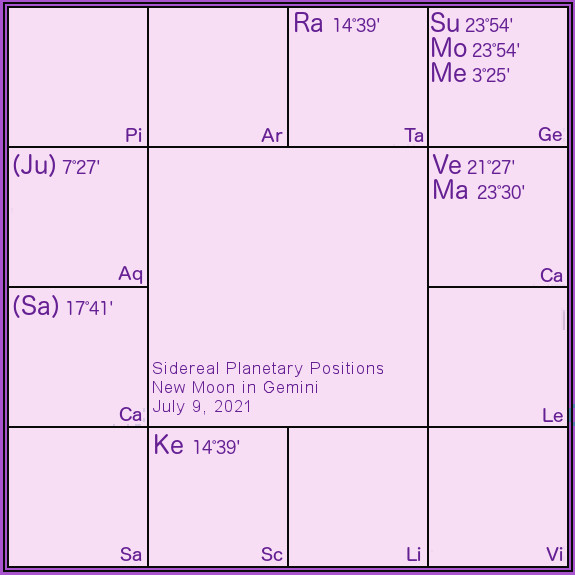
Retrograde Jupiter and Saturn
Jupiter and Saturn remain retrograde, giving us a chance to slow down and reflect on a lot of the issues guided by these two in our natal charts. Jupiter rules over our philosophies and ideas, the teachings we have taken on and let guide our opinions and value systems. This period of retrograde may cause us to reflect on this, perhaps re-evaluating some opinions, or choosing new teachers or a new course of education that might begin once Jupiter is direct again. This can also influence the areas of life indicated by Jupiter in your natal chart and have more effects depending upon placement and dasha.
Saturn, likewise, rules certain areas for each of us, and for all of us guides our discrimination and determination, particularly when it comes to long-term goals and pursuits. His retrograde journey each year is a time to re-examine where our commitments lie, and to what we are truly committed that is in alignment with our lifelong pursuits and the underlying structures that support us.
Saturn’s retrograde trip is from May 23rd through October 10th, while Jupiter’s is from June 20th through October 17th.
Venus-Mars War
Venus and Mars are approaching each other in sidereal Cancer, entering a planetary war during which they are within one degree from July 11th through the 14th. Venus is far brighter than Mars, who is already debilitated in Cancer—although this debilitation is heavily modified by the strong direct aspect from his ruler, the bright, powerful, retrograde and sva (in-his-own-sign) Saturn. Nevertheless, Venus most likely wins the war and we may find that our desire nature, sensual indulgences, and attachment to romance and pleasure will beat out any strength in discipline and boundaries that we hope to hold over these few days. If keeping strong boundaries or discipline is a challenge for you in general, be sure to source all your resources to stay strong during this war.
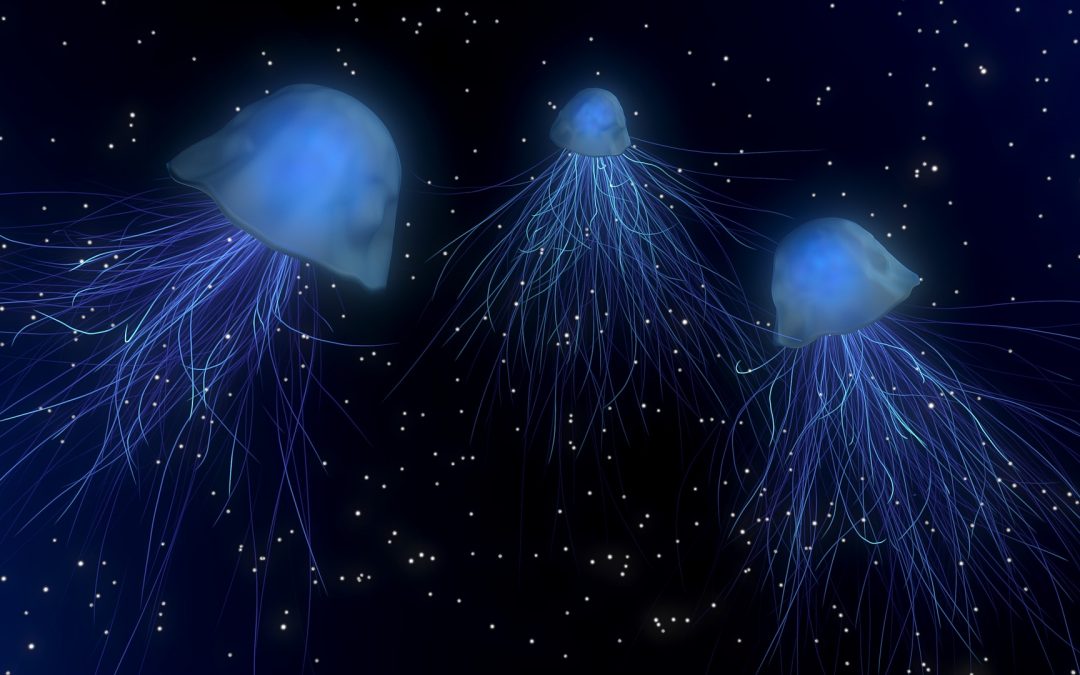
by Somya Devi | Apr 8, 2021 | Astrology, Conjunctions, Holy Days, Planets Changing Signs
New Moon April 2021
The Moon and Sun join to make a New Moon at the very end of sidereal Pisces at 10:31 pm ET on the dark night of Sunday, April 11th. This will begin a lunar cycle in which the Sun spends most of his time in Aries, his sign of exaltation. Jupiter, one of the outer, slower-moving planets, has transited into sidereal Aquarius, breaking rank with Saturn who remains in Capricorn.
Pisces-Aries Cycle
We enter another lunar cycle during which the Sun begins in one sign just two days before entering another, where he will spend most of the lunar cycle. Pisces is the last sign of the natural zodiac, the end, a place where we connect with the unseen world including the underworld itself. Aries, on the other hand, is a place of beginnings, the true springtime energy where the literal sunlight gives life to the world once again and things begin to grow outwardly. This cycle will connect these two worlds for us, bringing much of the subconscious into light as we begin to take on more activity during this season.
The Sun and Moon begin joined with a debilitated Mercury, which can make us pass up practicality in favor of hopes and dreams. Jupiter rules this femenine (inward-looking) water sign.
Revati Nakshatra
The Sun, Moon and Mercury are all in Revati nakshatra as we begin this Moon cycle. The final of the 27 Vedic nakshatras, this sign has to do with journeys, and is ruled by the deity Pushan, the protector of journeys, flocks and herds. We can imagine in particular the journey from life to death as this is the final journey that we all make. Revati means “the wealthy” and is also related to Mercury, Vishnu and Lakshmi. There is a strong association with animals and this nakshatra, and many people with planets here have a strong love of pets or animals.
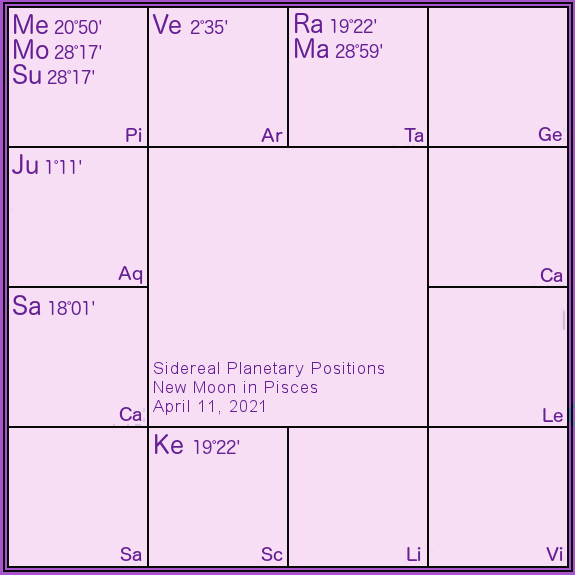
Jupiter Transit
Jupiter has moved from sidereal Capricorn into Aquarius, lightening his load as he is no longer in his sign of debilitation and joining the heavy presence of Saturn. Jupiter in Aquarius could stimulate some expansion in social programs, scientific innovations, and forward-thinking across society. This new position could stimulate some movement in your life depending on natal planetary positions and the current dasha (planetary period) and bhukti (sub-period) you are running according to your chart.
Mars Transit
Mars will leave Taurus just hours after the New Moon, finally parting ways with Rahu, lessening some of the intensity that has built up around their conjunction the past couple of months. His movement will also break the Kala Sarpa cycles, although with only one outlier the nodal alignment can still bring some intensity to current events or those born with these placements in the birth chart.
Chaitra Navaratri
This New Moon is followed by nine nights that are the springtime celebration of the goddess known as Chaitra Navaratri. These nights are celebrated in homage to the divine mother in her many forms, particularly Durga. This is not as largely celebrated as the fall-time Navaratri (Sharad or Maha Navaratri), but is also significant. This leads us up to Hanuman Jayanti which will be celebrated around the time of the next full Moon.










